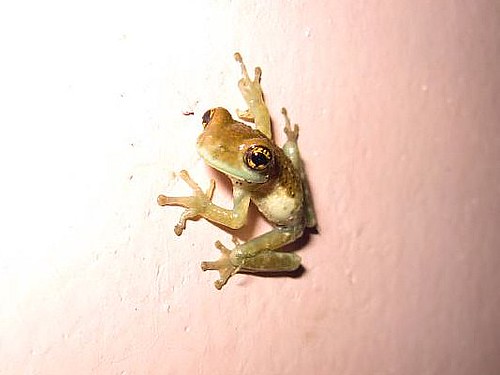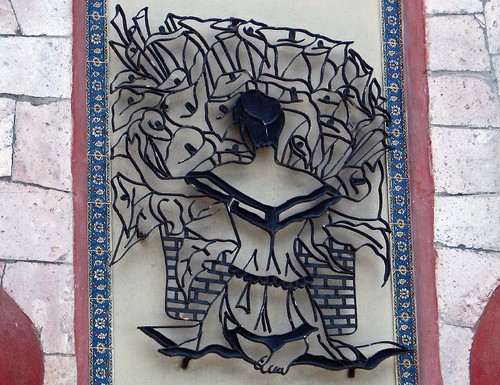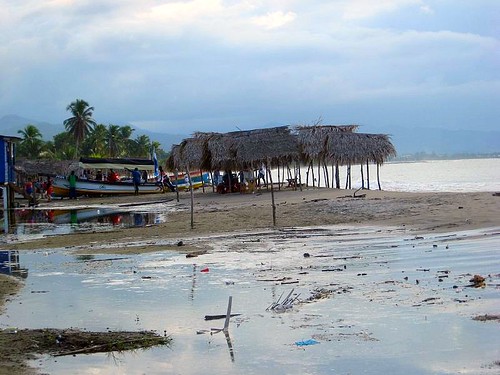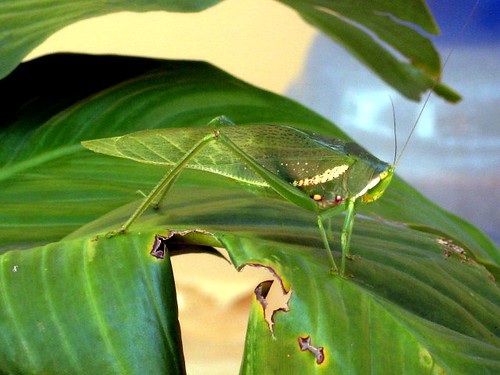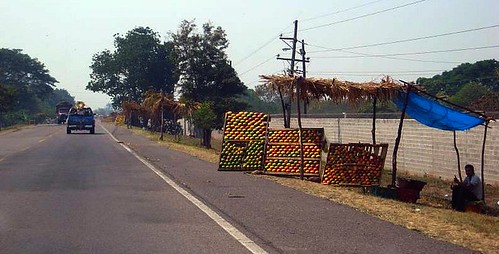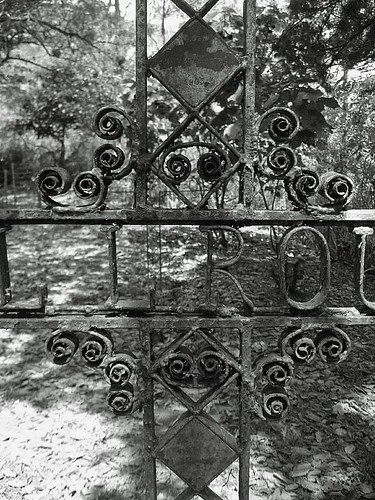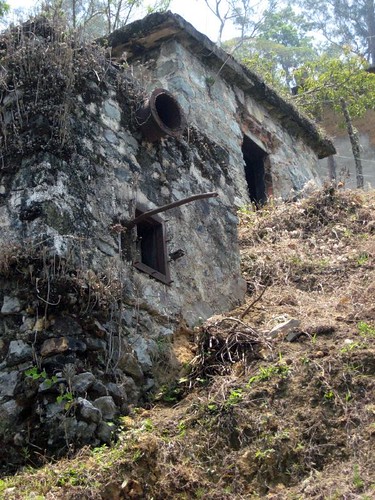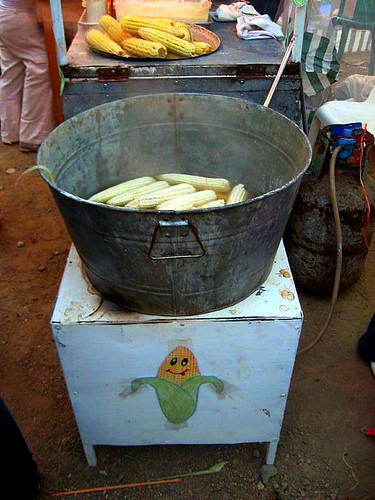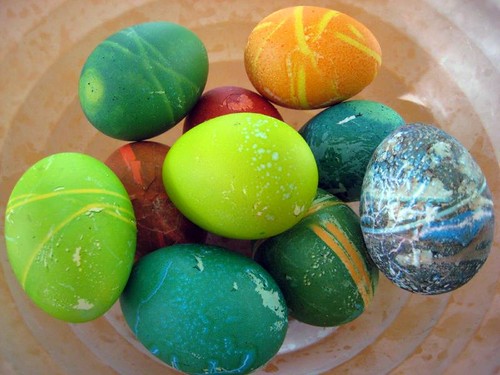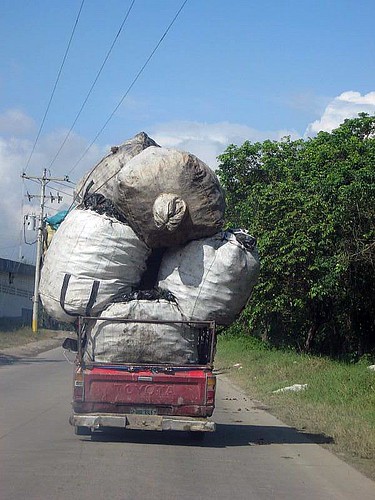On the wall outside our front door was this little sticky frog. He was so cute because of his size. He was not much bigger than a US quarter. It was hard to get a clear photo because I had to zoom in so much. I turned to go get something to put next to him for size comparison, and as I turned he took his chance and leaped and was gone into the night.
Saturday, December 13, 2008
Monday, May 26, 2008
The Flower Seller Sculpture
This sculpture is on a building in San Pedro Sula. It struck me the first few times I drove past and left me staring wondering about it. Then I saw a print of Deigo Rivera's The Flower Seller. Ah ha! After a little investigation I learned that this sculpture looks to be a mix of his works The Flower Seller and Nude with Calla Lilies. I really enjoyed the sculpture though it was hard to get a good photo from below on the street.
Thursday, May 22, 2008
Benign Girl
I had to look up what "benign" actually meant when I saw this toy for sale on the street. I don't think I have heard this adjective used this way before.
Monday, May 19, 2008
Pool Top Wagon
Horse drawn wagons are common as a means of transportation, especially for the "invaders" as I mention in the previous post.
I am always amused by the craftiness and resourcefulness seen sometimes. Here this wagon has a child's pool stretched over the top to provide shade from the beating sun.
Thursday, May 15, 2008
Invader Road
There are communities, usually along rivers that have been built up by people that "invade" the land. They are nicknamed "the invaders" for this reason. They make homes out of found objects and scraps. They tap into city water lines and electric lines. They have no rent and no utilities to pay, but they are usually the ones that work for the lowest wages. Many will be fortunate to make US $5 a day. The city does not kick these people out or try to cut the lines that they tap into. You can see the electric line poles erected and the lines spliced and stretched everywhere.
At one time the city constructed apartment type dwellings for these people to go and live - for free! Taking advantage of an opportunity to make some money they sold the properties given to them and moved right back to where they came from. I think we often feel inclined to feel sorry for these people, but they often live how they do by choice. It's how they have always lived and it is what they know.
Children choose not to continue with school or are encouraged to work to help bring in money for the family. I think it becomes almost "uncool" in this sub-culture to want to continue with school past maybe the 5th or 6th grade. True, the schooling is poor but it's the attitude too that schooling in unnecessary because there is little aspiration to move out of this type of living.
Sunday, May 11, 2008
Jellyfish In A Cup
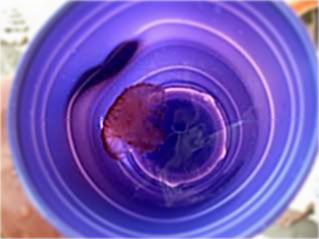
The kids caught this little jellyfish in the surf at the beach in the previous post. You gotta be careful out there. Some people can be really allergic to the stings. One thing I didn't know that the local kids showed us is that if you hold your hand out flat and put the jellyfish in the palm of your hand they won't sting you.
The quality of the image isn't the best, but I'm sharing it because I love the plastic blue cup color and the pattern of rings created by the light shining through creating a focal direction.
Saturday, May 10, 2008
Garifuna Beach
A stones throw from the building in the previous post you will come upon this Garifuna beach. This place offers locals and tourists a beach retreat for an economical price. You can rent one of the palm roof spots for a few dollars. You can order a typical Garifuna plate of fried fish and rice and beans made with coconut milk and dine on the beach. It's not the most pristine beach, but certainly is not the dirtiest. Hammocks are nearby to relax in and they have a good supply of cold drinks to keep you refreshed.
Thursday, May 8, 2008
Artesanias Madounu
This photo is taken in a Garifuna community near Tela. Here a shop has been set up where jewelry is made out of coconut shells.
Wednesday, May 7, 2008
Big Green Grasshopper
This midwestern city girl hadn't seen a grasshopper like this until I moved to Honduras. I wasn't even sure what it was at first.
Monday, May 5, 2008
Mangoes For Miles
One of my favorite fruits is in season as I mentioned in a previous post. This means that some people that have a supply of mangoes from someplace will set up a road side stand. This image was taken on the road to Tegucigalpa just outside Comayagua. The vendors seem to go on for as far as the eye can see. Not sure how they might feel about their competition or maybe they are all in cahoots anyway.
Saturday, May 3, 2008
Grave Marker
In the "Gringo Graveyard" there is about 7 grave sites all in a single row marked with metal crosses. The top diamond plate has the birth year engraved and the below diamond plate has the year of death. The names were worked in with metal lettering. Some of the letters were missing making the names unknown.
I wasn't sure just how to go about taking photos of the grave sites. I'm not sure what is considered disrespectful to the dead. We know, at least, that they are not forgotten and still remembered for what they brought to San Juancito. Rest in peace.
Friday, May 2, 2008
Saltboxes in Honduras
The homes surrounding the US Consulate are colonial saltbox style clapboard homes. The picture above shows the back side of the house. At the front of the house you can see a stone marker probably saying something about the home and it's history. I didn't get a chance to read it as I was holding things up by stopping our trek up the mountain to take photos. I thought I might be a little nervous living in one of these homes with them being built along the slope of the mountain with long posts driven down into the ground to hold the home up. Something must have been done right in the construction to keep the house up for nearly 100 years now.
The larger two story house "next door" to the consulate was in such a state of disrepair. It is currently undergoing renovations. Either to preserve or to inhabit the home. If you can see the interior walls have been redone. Interesting the way the exterior is ripped wide open for all to see inside.
The photo taken from further up the road I also posted yesterday, but I just wanted to show again the steep incline these homes were built on. Yikes!
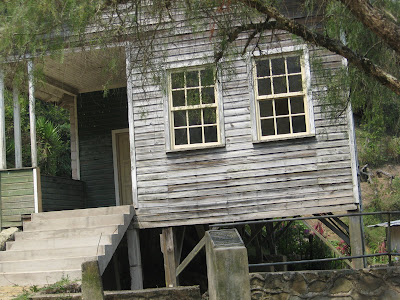


Thursday, May 1, 2008
US Embassey San Juancito Honduras
The owner of the resort we stayed at explained that this building is a US Consulate started in the first part of the 1900's. She even went on to say that this is the first US Embassy in all of Central America. Here is some more interesting information about the mining town up in the mountains of Honduras.
Looking at this house you can see that it is clearly American architecture. You can imagine the two flag poles in front, one waving the US flag. We wanted to get a closer view, but the property is still US owned. Some locals are hired to live on the land next to the building and they oversee it's care. Mainly to cut the grass and make sure no unwelcome guests find their way in.
Below are a few more images. One up close and the other up the road a short distance.


Wednesday, April 30, 2008
Gold Mine Property
This is on some property on the mountain of San Juancito. There were Americans in the early 1900's set up there in Honduras. They mined for gold and processed it on this property. Not sure what these buildings are, but they looked interesting.
More photos of the Americans and the mark they made in San Juancito to come, so stay tuned.
Tuesday, April 29, 2008
Crazy Corn
These corn on the cobs are not sweet corn. They are called elote. They have a bland corn flavor. The bucket of corn is being cooked by a heater of some kind in the box with the corn cartoon. You can see the fuel tank with a line under the box. The corn is then put on a stick slathered in mayonnaise and sprinkled with grated cheese that is similar to parmesan cheese. This treat they call "crazy corn".

Monday, April 28, 2008
Two Blue Buckets
Two metal pots sitting near the water spigot next to a pulperia in San Juansito. I loved the colors.
Wednesday, April 23, 2008
Decorated Eggs
I know it's a month past Easter, but I never got a chance to show off the Easter Eggs we made here.
In Honduras they don't celebrate Easter with much candy, bunnies and chocolate as in the states. We could not find anything to decorate Easter eggs either. You know those little kits you can buy with the little coloring pellets. Thanks to my sister she showed me a website that gave some really fun ways to decorate with things around the house. The decorating was fun and the eggs turned out really pretty, don't you think?
But one thing happened that I didn't expect. There was this film like stuff that made the dyes not stick well to the eggs. There was lots of peeling and flaking. I was curious why this was happening. Then I started thinking how in Honduras eggs are not kept in the refrigerated section of the grocery stores. They are kept out on the shelf at room temp. Why? A little strange for me at first to see, but now I'm used to seeing it. Then it occurred to me that this film that I was seeing while decorating my eggs must be removed in the states when they are cleaned, sanded and bleached to be perfectly white removing the protective coating making them more perishable. Thus, needing refrigeration.
Okay, that's my theory. Correct me if I'm wrong. I thought the eggs were pretty enough to share the photo.
Tuesday, April 22, 2008
Stuffed truck
This is a truck heading for the plastic recycling center. You can see the center on the left in the photo. It's the white building. Trucks of all kinds will carry as much plastic pop bottles as they can and drop them off for some cash. How high they can stuff the trucks is most often an interesting feat in defying gravity. As you can see the truck is literally being run into the ground. Also note the puff of exhaust. There is no exhaust regulations or clean air act in Honduras. At least they recycle.
Saturday, April 19, 2008
Lazy Lagoon
At the Parque Ecológico Infantil San Ignacio in Masca, Cortés. This is a water park and zoo about 20 minutes past Puerto Cortes on the north coast of Honduras. There is a lazy lagoon to take a relaxing stroll around. There is a monkey island that you can just slightly see in this photo where some more active monkeys live. When you walk by you can see them out there playing and jumping around the trees. Park staff take a boat out to feed them.
Thursday, April 17, 2008
Now In Season
Mangoes allowed to ripen on the tree in the right environment taste so, so, so delicious. Like candy. One way locals here like to eat them is a little green and then they sprinkle salt, pepper, cumin and lime. It's an interesting mix of flavors. We like to eat them fresh or with some yogurt in our house.
Tuesday, April 15, 2008
San Pedro Sula Sunset
This photo was taken by my daughter one night while on a walk. We were talking about how pretty the sunsets are in Honduras so she decided to take the photo. The city of San Pedro Sula is in a valley surrounded by hills. Driving out of the city always offers great views.
This photo is from within our residential so you can see the perimeter wall. The trees in the photo are not dead. They have dropped their leaves and will start to grow new ones soon. I've heard this time of year in Honduras is sometimes called "summer-fall" because it's so hot yet the leaves are dropping too.
Saturday, April 12, 2008
Corn Grinder
 This is a corn grinder that is used to make homemade masa. The best tamale I've ever tasted was made from corn ground in the grinder the same day it was made. There is nothing like fresh.
This is a corn grinder that is used to make homemade masa. The best tamale I've ever tasted was made from corn ground in the grinder the same day it was made. There is nothing like fresh.
Form Follows Function
 You can see how form followed function in bathroom design in this photo.
You can see how form followed function in bathroom design in this photo.As I start out the blog I want to say that I live in San Pedro Sula, but will also share photos from around Honduras. In the next few days I'll be sharing some photos of one of my favorite places in Honduras, Copan Ruinas. This city is about 4 hours by bus from San Pedro Sula up in the mountains.
Seed Pod Puffs
Seed puffs released from seed pods this past week in our neighborhood. I tried to figure out which type of tree they come from and think I've narrowed in down to the Kapok tree.
I would have liked if they were more like dandelion puffs or cottonwood tree seed puffs that blow around when you walk through them. It would have been a little more fun. There was a cottonwood tree up the street from where I grew up in MN and when the seeds were released it always looked like it was snowing in July and I enjoyed running through the cotton "snow". These seed puffs are a little more dense and tend to stay in one place once they've landed.

